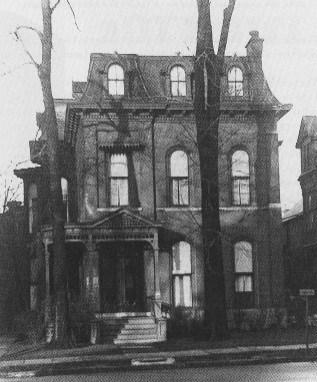By September 11th of 1869, Sam had changed his mind regarding the lecture circuit and began his "Our Fellow Savages" tour until January 21, 1870. He married February 2, 1870 and was soon living in a mansion on Delaware Avenue.
He seems to have had a change of personality at the time of his move to Buffalo. Money has always preoccupied him, throughout his life and is a common factor in much of his writings. But his move to Buffalo marks a change from a humanistic bent to one of allegiance to big business. See this from Scharnhorst Pages 512-4 The Life of Mark Twain: The Early Years, 1835-1871:
From page 531:
Joe Goodman, who visited the Clemenses in Buffalo in April 1870, was flabbergasted by the changes he witnessed in Sam's behavior since the Virginia City days, particularly his adherence to mid-Victorian standards of bourgeois respectability.
Mark Twain is in Buffalo and feels he will no longer need to take to the platform.
To James Redpath
10 May 1870 • Elmira, N.Y.
Friend Redpath,—
I guess I am out of the field permanently. I am sending off these circulars to all lecture applicants now. If you want some more of them I can send them to you—for they are very convenient for you to mail to people save penmanship.
Have got a lovely wife, a lovely house, bewitchingly furnished, a lovely carriage,& a coachman whose style dignity are simply awe-inspiring—nothing less & I am making more money than necessary, by considerable, & therefore why crucify myself nightly on the platform. The subscriber will have to be excused from the present season at least.
Remember me to Nasby, Billings & Fall. Luck to you! I am going to print your menagerie, Parton and all, and make comments.
In next Galaxy I give Nasby’s friend and mine from Philadelphia (John Quill, a literary thief) a “hyste.” I don’t consider that the Rev. Talmage has the weather gage of me yet.
Yours always & after,
Mark.
For a in depth study of Mark Twain's life in Buffalo, NY see Scribblin' For A Livin' by Thomas Reigstad.
It took a series of tragic events to take Sam out of this mindset.
All too soon events, and a dissatisfaction with his situation bring about a change of mind. Olivia became pregnant, but was devastated when her father was diagnosed with stomach cancer and died on Aug. 6, 1870: Emma Nye, a dear friend of Olivia’s who was visiting, was stricken with typhoid fever and died in their home Sept. 29: Finally, their son, Langdon, was born prematurely Nov. 7, frail and sickly, and Olivia fell ill with typhoid herself.
They had had enough. Olivia was carried out of their home on a mattress to the train station for the trip to Elmira. Both the home and Twain’s stake in the Express were sold at a loss.
